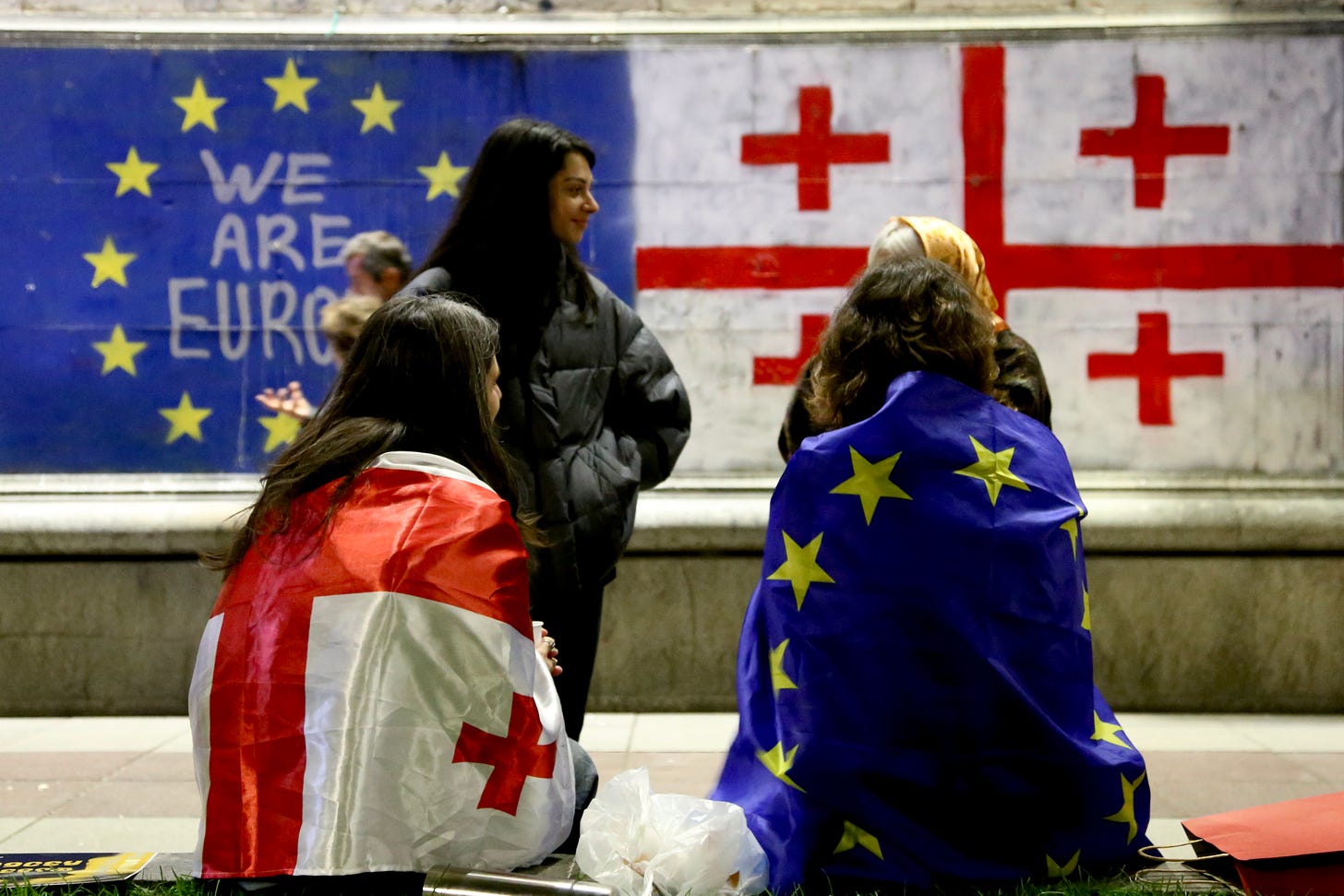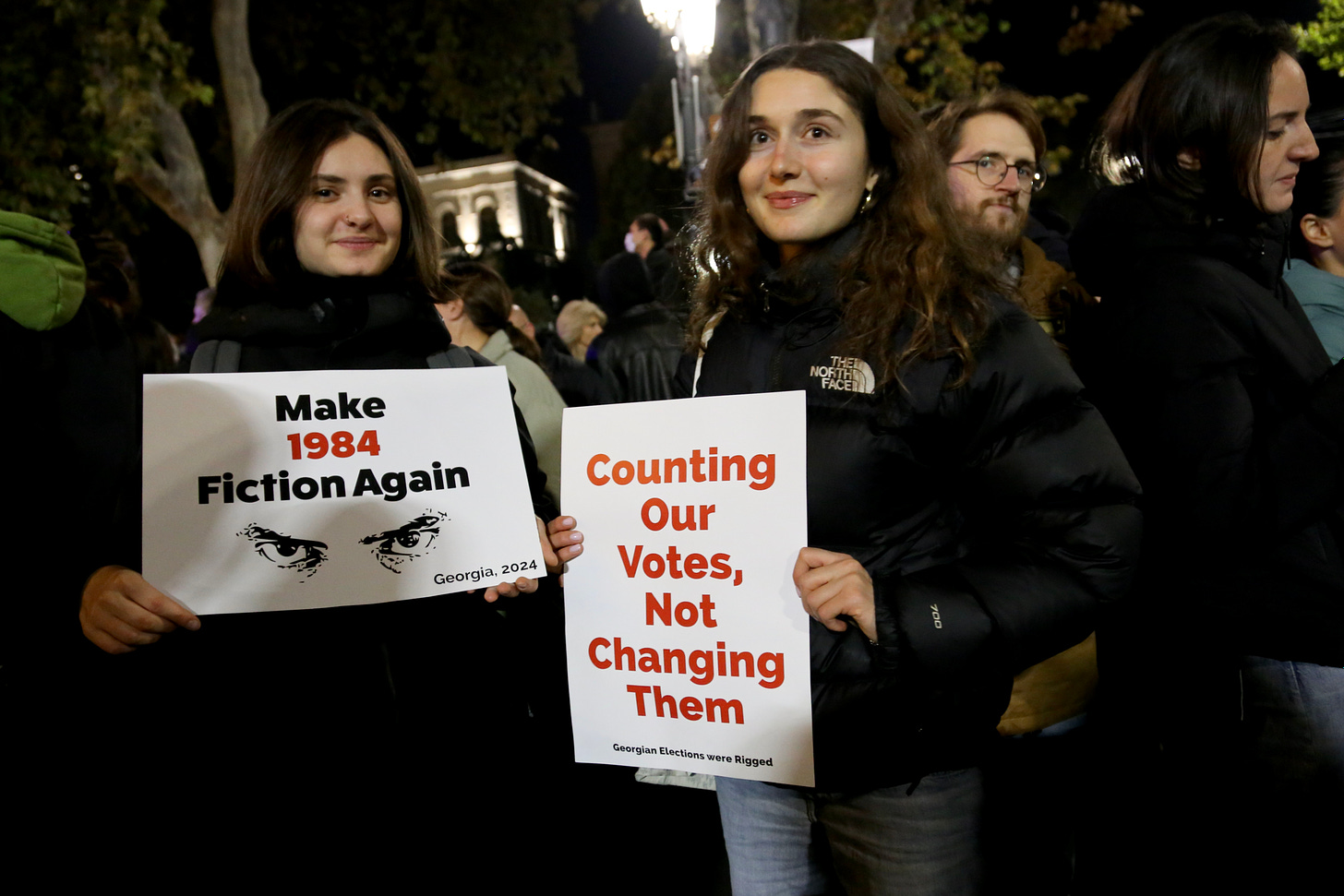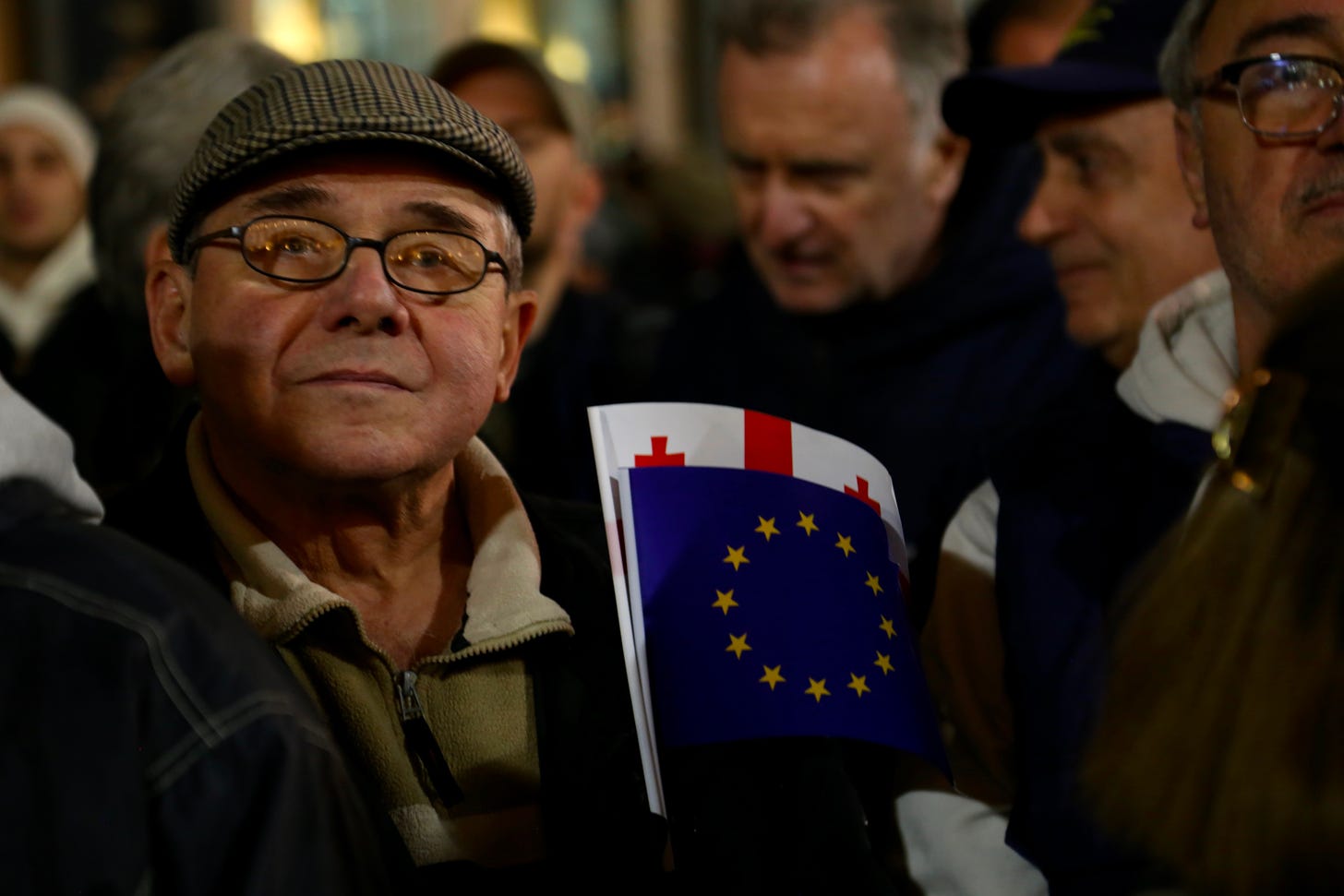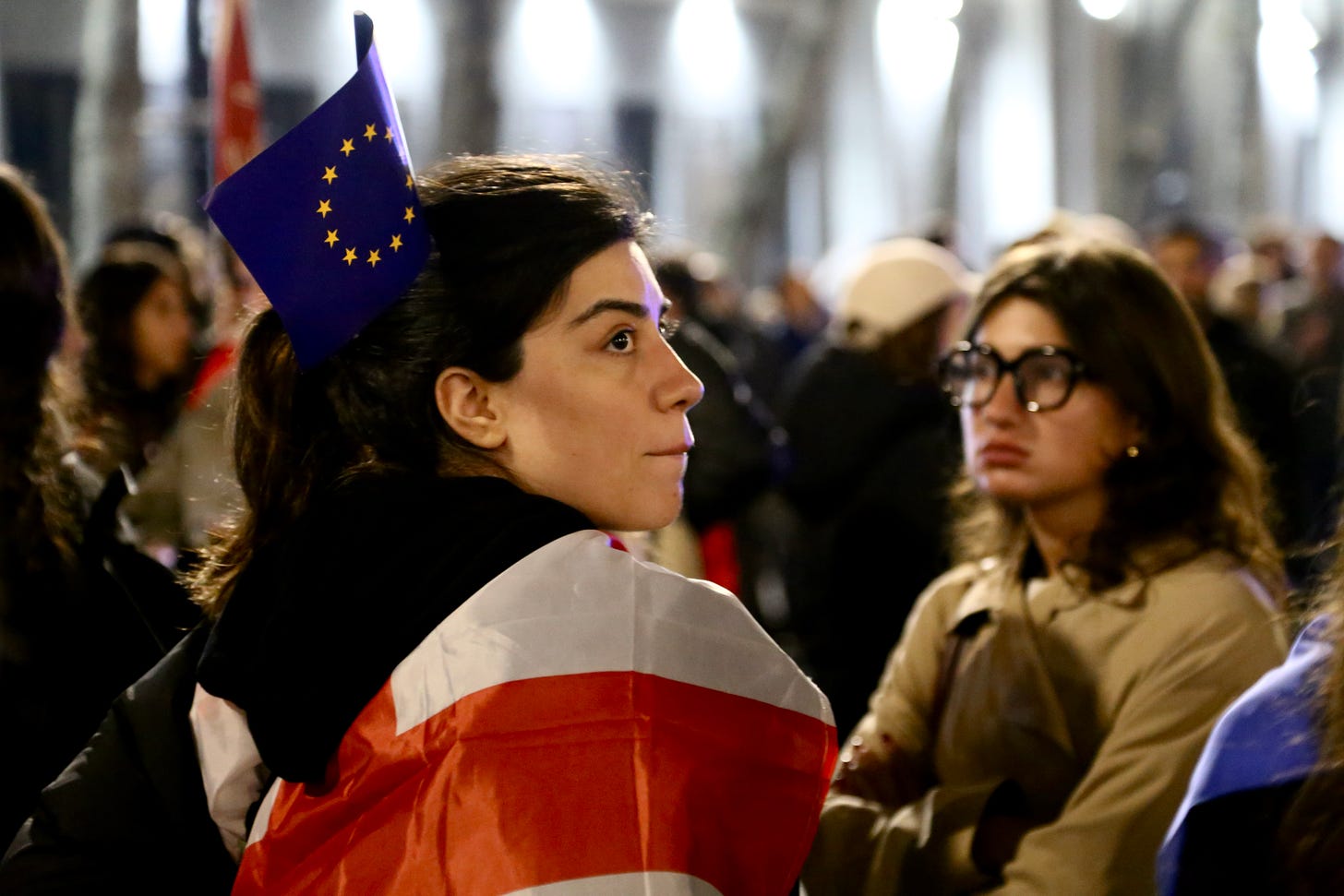S5E6. Eastward. It's time to look further east
Protests against election fraud in Georgia highlight the importance of civil mobilization in resisting authoritarian trends - a message for all EU candidate countries and beyond. Report from Tbilisi
Dear reader,
welcome back to BarBalkans, the newsletter with blurred boundaries.
I know you may be wondering what Georgia has to do with a newsletter about the Western Balkans. After all, this country is located in the South Caucasus, thousands of kilometers away from the region we are examining week after week.
But it is all connected, it requires just a leap of faith.
I also ask for your understanding, as it might feel like a stream of consciousness. There is so much happening right now in one of the most pro-European countries among those that aim to join the European Union, and I have been deeply involved in these events for days.
I will do my best to summarize all of this, highlighting the ties to the countries in the Western Balkans that have applied to be part of the European project.
Here, from the streets of Tbilisi, Georgians are responding to what the define “the theft of our votes and our European future.”
What happened in Tbilisi
On October 26, Georgia held general elections, featuring a challenge between the ruling party Georgian Dream - which has been in power for 12 years - and four opposition coalitions united under the ‘Georgian Charter’.
The ‘Georgian Charter’, presented by President Salomé Zourabichvili some months ago, aimed to outline a post-election plan for re-establishing the path toward European integration. This initiative followed several laws enacted by Georgian Dream and that ‘de facto’ froze Georgia’s EU accession process, which remains at the candidate status (granted in December 2023).
The election day was marred by an unprecedented wave of electoral fraud and violence inside and outside polling stations, attributed to affiliates of the ruling party. This was documented through hundreds of photos, videos, and audio recordings gathered by ordinary citizens and election monitoring organizations.
Reports include multiple voting using a single ID, violations of ballot secrecy, corruption, threats of personal or professional repercussions, pre-filled ballots, and violence against observers trying to report the fraud.
Georgian Dream secured 54% of the votes, defying exit polls in a highly questionable manner. Inconsistencies in the data from peripheral areas and regions with ethnic minorities - more susceptible to propaganda and intimidation from ruling party officials - underscore these concerns.
President Zourabichvili stepped in to address the situation, speaking to the nation on the evening of October 27, flanked by key figures from pro-European coalitions:
“As the last independent institution in this country, I must clearly state that I do not recognize these elections. Recognizing them would be tantamount to legitimizing Russia’s takeover of Georgia.”
From the presidential palace, she called for a mass protest on October 28 outside Parliament, aimed to ensure that “free, fair, and democratic elections can still take place in this country.”
The following day, tens of thousands of people joined the protest, making it clear that they would never accept the election results without “truth” about what occurred on October 26.
“I had different plans for my future than being forced to flee my country out of fear of persecution for my beliefs, like in Russia,” told us Maia, a student at Tbilisi University.
With this warning echoing along Rustaveli Avenue, efforts have already begun to collect all the evidences needed to provide a complete picture of what happened: “A massive, systematic theft of votes - an unprecedented and coordinated operation,” the Head of State explained.
This work will be carried out in partnership with European and US allies, whose support could prove crucial.
Meanwhile, the four opposition coalitions are refusing to enter the “illegitimate” Parliament, ultimately calling for new elections overseen by an international electoral administration.
Why this matters
What is happening in Georgia should raise alarms for all of us. If such events can take place in a country with a robust civil society and a strong democratic aspiration, they can happen anywhere. Just look at the situation in Hungary, for instance.
There is another important aspect to consider. Georgia is not the first of its kind, and the European Union has often overlooked similar situations.
While election fraud might not always be so obvious or on a large scale, in other EU candidate countries, opposition voices have been silenced through troubling tactics. Serbia, under President Aleksandar Vučić, is an example: the ruling party consistently manages to secure electoral victories despite accusations of manipulation, intimidation, and systematic advantages.
Read also: S2E30. The Super Sunday
Another factor is the Russian influence, extending from Hungary through Serbia, the Republika Srpska (the Serb-majority entity in Bosnia and Herzegovina), North Macedonia, and all the way to Georgia. The Kremlin has a clear interest in destabilizing regions involved in EU enlargement, relying on autocratic or illiberal regimes to spread its propaganda.
This is exactly what Georgian Dream aims to achieve, as a party aiming at controlling all national institutions at every level. While it claims to support EU integration, its policies are heavily influenced by Russia, misleading a society where over 80% see their future within the European Union.
So, one might ask: is it all over? What is the point of taking to the streets?
Taking to the streets, refusing to accept the status quo, and ensuring that silence does not cloak electoral fraud in impunity are the only options left for civil society and ordinary citizens.
Elections can be lost, but it is unacceptable for one person’s vote to count as 1 while a vote from those in power counts as 50. Clarity, transparency, and truth are essential.
It is also crucial for the international community to support investigations. Accountability for those responsible for this extensive fraud - which has crossed a line and been exposed - must be achieved through legal means, not through subversion.
Read also: S4E21. One vote can change everything
Hoping this story does not end in a slide toward authoritarianism, Georgia should serve as a warning that similar situations are already unfolding in other countries aspiring to join the EU.
If we encourage civil society in Serbia and Bosnia and Herzegovina, for example, to hold onto hope and take to the streets to demand their rights - never giving up - then we cannot apply double standards.
Electoral fraud must be thoroughly investigated in Georgia through the support of the international community, and the same should be demanded elsewhere, regardless of economic interests.
We owe it to our brothers and sisters who view the European Union as their free and democratic home, to which they will one day return.
Sakartvelos gaumarjos.
Glory to Georgia.
Pit stop. Sittin’ at the BarBalkans
We have reached the end of this piece of the road.
Today, there is only one recommendation at our bar, the BarBalkans: the orange wine, whose birthplace is Georgia.
Historians confirm that winemaking began here thousands of years ago, through the maceration of white grapes in kvevri - large terracotta jars resembling amphorae.
Although made from white grapes, orange wines are produced like reds. This means the juice is left in contact with the grape skins in a process known as maceration.
This process can last from a few days to several months and is entirely natural. The wine is then transferred to barrels without additives and often bottled without filtration.
Read also: S2E31. Orange is the new white
Let’s continue BarBalkans journey. We will meet again in two weeks, for the 7th stop of this season.
A big hug and have a good journey!
If you have a proposal for a Balkan-themed article, interview or report, please send it to redazione@barbalcani.eu. External original contributions will be published in the Open Bar section.
The support of readers who every day gives strength to this project - reading and sharing our articles - is also essential to keep BarBalkans newsletter free for everyone.
Behind every original product comes an investment of time, energy and dedication. With your support BarBalkans will be able to elaborate new ideas, interviews and collaborations.
Every second Wednesday of the month you will receive a monthly article-podcast on the Yugoslav Wars, to find out what was happening in the Balkans - right in that month - 30 years ago.
You can listen to the preview of The Yugoslav Wars every month on Spreaker and Spotify.
If you no longer want to receive all BarBalkans newsletters (the biweekly one in English and Italian, Open Bar external contributions, the monthly podcast The Yugoslav Wars for subscribers), you can manage your preferences through Account settings.
There is no need to unsubscribe from all the newsletters, if you think you are receiving too many emails from BarBalkans. Just select the products you prefer!









